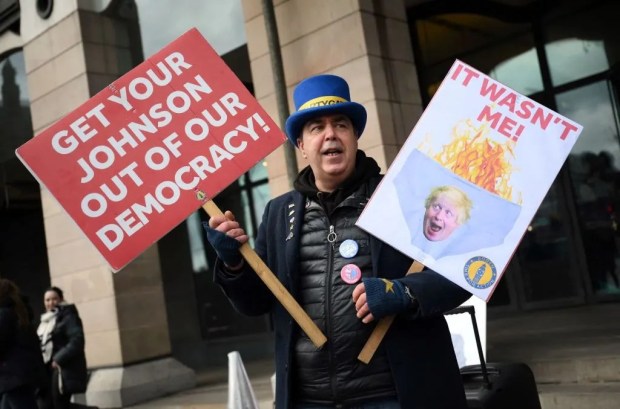Boris Johnson’s ‘green industrial revolution’, which was announced this week, looks doomed from the outset. From our heating to how we transport food, the proposals would mean a complete overhaul in the way we live. Yet barely a word has been said about the immense practical difficulties involved in Johnson’s ten-point plan for Britain to go carbon neutral by 2050. Make no mistake, it will be close to impossible to achieve – and even trying could prove catastrophic.
Nowhere is the flaw in the government’s plan more clearly exposed than in the announcement that sales of new petrol, diesel and hybrid cars will be banned by 2030. There are more than 38.9 million cars, vans and lorries on our roads today. We would likely need to build over ten million charging points – amounting to thousands a day between now and 2030 – to totally switch over to electric vehicles. Is this really realistic?
And can our current infrastructure cope with this surge in demand? Typical UK homes use a daily average of 2kW of electricity throughout most of the year, which rises to a peak of around 7kW during winter. Most cars charge at 7kW for a typical eight hours, and get anything from 30 miles of range per hour for a small car, to less than 20 miles for a larger car. In other words, every time an electric car is charged, it requires more than double the amount of electricity an average home uses now. And faster chargers are not a solution, either, for they draw more current, which will cause infrastructure challenges.
In August 2019, there were power cuts across Britain after a series of failures led to electricity outages. The move towards electric vehicles and domestic heating based around electric heat pumps is going to increase demand and reliance upon the electricity grid. Yet there was little detail on the wholescale upgrade to supply that will be required if Boris’s plan is to work smoothly.
Johnson’s green revolution would mean that we would need to completely upgrade electric wiring in our homes, streets, substations, and transmission lines. To meet demand would require enormously costly upgrades to local electricity grids, which we would all ultimately pay for through higher energy bills. If this really is part of the plan, then the government must be honest about who is to foot the bill.
We also won’t have to wait for long to see other massive infrastructure problems confronting us. Many people don’t have the luxury of a driveway where they can charge their vehicles; four in ten cars today are parked on the road. So how, when, and where are these cars going to be charged? And what would electric vehicles mean for the haulage industry? Electric trucks will need to be charged for 24 hours, resulting in less time on the road, unless there is a huge infrastructure for battery swapping.
Then there is the problem with the nature of the batteries electric vehicles use. How will we manufacture the gargantuan number required, for the UK, as well as the rest of the world, which is supposed to follow our lead? To build, maintain and dispose of these batteries on the scale required for an electric fleet of UK vehicles would mean the world’s supply of lithium, cobalt and nickel would need to increase overnight. Who will ensure the correct number of batteries are available? And what happens if they are not? You won’t hear it from Extinction Rebellion, but the mining of cobalt often has a high human cost: children as young as six are among those already risking their lives in the Congo to ensure that supply can keep up with demand.
Even if the plan to go for electric-only new vehicles by 2030 succeeds, would it make any difference at all to the global climate? It’s unlikely, especially if 40 per cent of the world’s poorest population (50 times the UK population) is still aspiring to a European standard of living, with greater energy consumption using mainly fossil fuels.
There is the awkward fact too that scrapping petrol cars and manufacturing new ones is no way to reduce emissions. And for the next 50 years or more, it is highly unlikely that there will be any measurable change to the world’s climate as a direct consequence of all our actions in the UK. In short, the end of our climate mitigation actions will not justify the means.
There is, though, a simpler and less costly behaviour change which could have a much greater impact on energy consumption and CO2 emissions than Boris’s grand plan. Nearly half of all UK CO2 emissions come from heating air and water in buildings: 27 per cent in homes and 18 per cent in all other types of building. One report from the Green Alliance has already suggested that merely reducing the use of transport and insulating our homes would go a long way to meeting the 2050 target. Should the Government be focusing on more realistic ambitions by encouraging us to take fewer journeys by car, or by better insulating our homes, rather than indulging in grand green projects?
The decision this week seems to have been made by climate scientists who have little practical understanding of their proposals. During my time as a government advisor, this was a constant theme. There is little sign of any project engineering input into these plans. There should have been integrated advice from both the Royal Society and the Royal Academy of Engineering, but they remain virtually silent on achieving the grand ambition.
I have no problem with this idea, provided that the mass switch over happens when we are actually ready. The pace of the uptake of fossil fuels was determined by many individual actions, not government diktat. The pace of abandoning fossil fuels should be the same. We simply have no comprehensive and agreed blueprint of how we all switch over to electric cars by 2030. In light of this, the Government’s latest announcement is reckless, unscientific and certain to fail.
Got something to add? Join the discussion and comment below.
Get 10 issues for just $10
Subscribe to The Spectator Australia today for the next 10 magazine issues, plus full online access, for just $10.
Michael Kelly is Emeritus Prince Philip Professor of Technology at the University of Cambridge and former Chief Scientific Advisor to the Department for Communities and Local Government




















Comments
Don't miss out
Join the conversation with other Spectator Australia readers. Subscribe to leave a comment.
SUBSCRIBEAlready a subscriber? Log in